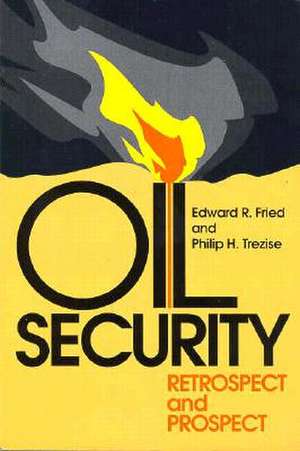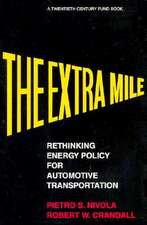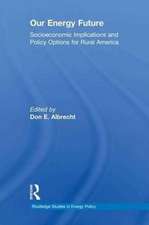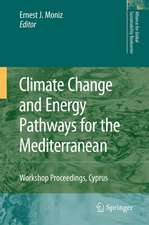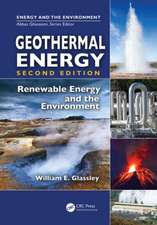Oil Security: Retrospect and Prospect
Autor Edward R. Fried, Philip H. Treziseen Limba Engleză Paperback – aug 1993
Oil stands alone among primary commodities in its potential for sending economic shock waves across the world. The value of oil production is one and a half times the world's total production of food grains; demand is unresponsive to price in the short run; and the world's oil resources are heavily concentrated in the Middle East, where political disturbances have been chronic and oil supply is subject to sudden interruption. Together, these factors have made oil a virtual rogue elephant in the world economy since 1973.
This book discusses the oil shocks of 1973-74, 1979-80, and the "minishock" of 1990-91, and examines the possibility of oil shocks over the next twenty years. The authors assess the world market outlook on the basis of underlying trends on world oil supply and demand. They take into account prospects for investment in oil production in the Persian Gulf states, the former Soviet republics, and Latin America; environmental factors and policies; and political uncertainties in the Middle East.
This book discusses the oil shocks of 1973-74, 1979-80, and the "minishock" of 1990-91, and examines the possibility of oil shocks over the next twenty years. The authors assess the world market outlook on the basis of underlying trends on world oil supply and demand. They take into account prospects for investment in oil production in the Persian Gulf states, the former Soviet republics, and Latin America; environmental factors and policies; and political uncertainties in the Middle East.
Preț: 139.35 lei
Nou
Puncte Express: 209
Preț estimativ în valută:
26.66€ • 27.91$ • 22.19£
26.66€ • 27.91$ • 22.19£
Carte tipărită la comandă
Livrare economică 31 martie-14 aprilie
Preluare comenzi: 021 569.72.76
Specificații
ISBN-13: 9780815729792
ISBN-10: 0815729790
Pagini: 100
Dimensiuni: 152 x 229 x 8 mm
Greutate: 0.15 kg
Ediția:New.
Editura: Brookings Institution Press
Colecția Brookings Institution Press
ISBN-10: 0815729790
Pagini: 100
Dimensiuni: 152 x 229 x 8 mm
Greutate: 0.15 kg
Ediția:New.
Editura: Brookings Institution Press
Colecția Brookings Institution Press
Notă biografică
Edward R. Fried is a senior fellow in the Foreign Policy Studies program at Brookings and a coeditor of Third World Debt (1989) and Building a Canadian-American Free Trade Area (1987). He served as President Carter's adviser on international energy and was U.S. executive director at the World Bank.
Philip H. Trezise is a senior fellow in the Foreign Policy Studies program at Brookings and a coeditor of Third World Debt (1989) and Building a Canadian-American Free Trade Area (1987). He was assistant secretary of state during the Nixon administration.
Philip H. Trezise is a senior fellow in the Foreign Policy Studies program at Brookings and a coeditor of Third World Debt (1989) and Building a Canadian-American Free Trade Area (1987). He was assistant secretary of state during the Nixon administration.
Descriere
Oil stands alone among primary commodities in its potential for sending economic shock waves across the world. The value of oil production is one and a half times the world's total production of food grains; demand is unresponsive to price in the short run; and the world's oil resources are heavily concentrated in the Middle East, where political disturbances have been chronic and oil supply is subject to sudden interruption. Together, these factors have made oil a virtual rogue elephant in the world economy since 1973.
This book discusses the oil shocks of 1973-74, 1979-80, and the "minishock" of 1990-91, and examines the possibility of oil shocks over the next twenty years. The authors assess the world market outlook on the basis of underlying trends on world oil supply and demand. They take into account prospects for investment in oil production in the Persian Gulf states, the former Soviet republics, and Latin America; environmental factors and policies; and political uncertainties in the Middle East.
This book discusses the oil shocks of 1973-74, 1979-80, and the "minishock" of 1990-91, and examines the possibility of oil shocks over the next twenty years. The authors assess the world market outlook on the basis of underlying trends on world oil supply and demand. They take into account prospects for investment in oil production in the Persian Gulf states, the former Soviet republics, and Latin America; environmental factors and policies; and political uncertainties in the Middle East.
